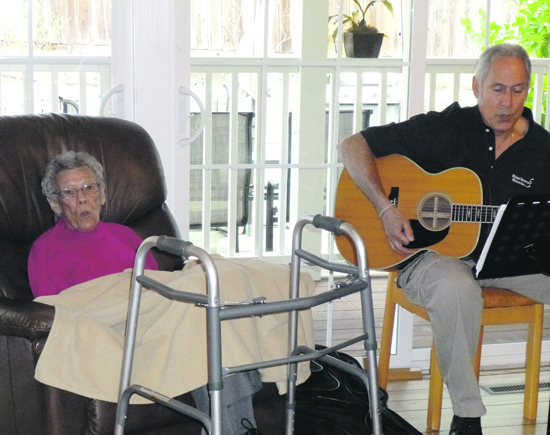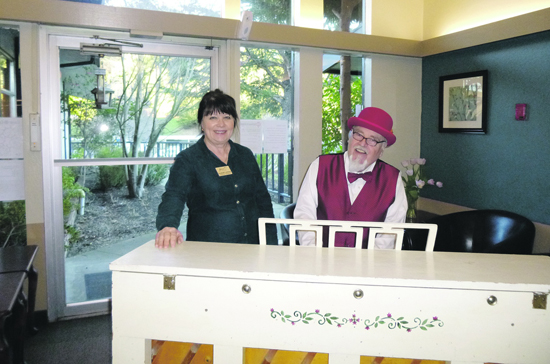| | Published February 13th, 2013
| Music Activity for Seniors with Dementia It's more than entertainment
| | By Sophie Braccini |  | | Michael Kistner plays the guitar at Moraga Retreat Care Home and Anne sings along. Photos Sophie Braccini
|
When Michael Kistner starts playing "Embraceable You" on his guitar in the Moraga Retreat Care Home where he comes twice a week, Jack, one of the six residents, never fails to sing the lyrics. His voice is clear, he is in tune and he remembers all the words. A remarkable thing, considering Jack suffers from memory loss.
 Many facilities that cater to the aging population use music as a vehicle to calm, heighten moods and trigger memories. Different from music therapy - the clinical and evidence-based use of music interventions to accomplish goals established by a credentialed professional - the facilities offer therapeutic music sessions performed by licensed professionals in that field to improve the lives of impacted seniors, as well as that of their caregivers.
Many facilities that cater to the aging population use music as a vehicle to calm, heighten moods and trigger memories. Different from music therapy - the clinical and evidence-based use of music interventions to accomplish goals established by a credentialed professional - the facilities offer therapeutic music sessions performed by licensed professionals in that field to improve the lives of impacted seniors, as well as that of their caregivers.
 Those who work with adults suffering from memory loss state that musical activities provide temporary well-being, improve mood, promote socialization and relaxation.
Those who work with adults suffering from memory loss state that musical activities provide temporary well-being, improve mood, promote socialization and relaxation.
 "Music brings out the personality that's hidden behind the dementia," agrees Elizabeth Lucaszy, the activity director at the Moraga Convalescent Hospital, which provides a musical activity twice a week to its residents and offers access to music in residents' rooms.
"Music brings out the personality that's hidden behind the dementia," agrees Elizabeth Lucaszy, the activity director at the Moraga Convalescent Hospital, which provides a musical activity twice a week to its residents and offers access to music in residents' rooms.
 James Ritz, who plays regularly at the hospital and other local elder care centers, noticed a difference between the Alzheimer's patients who prefer to sing along and to participate, and people with other forms of memory loss who prefer to listen, as music loosens their emotions.
James Ritz, who plays regularly at the hospital and other local elder care centers, noticed a difference between the Alzheimer's patients who prefer to sing along and to participate, and people with other forms of memory loss who prefer to listen, as music loosens their emotions.
 "At first I thought I was providing entertainment, but now I know that what I do is act as a can-opener for people's memories," says Ritz. "I can't predict what will be the trigger for each person, but there is usually something for everyone."
"At first I thought I was providing entertainment, but now I know that what I do is act as a can-opener for people's memories," says Ritz. "I can't predict what will be the trigger for each person, but there is usually something for everyone."
 At Aegis there are 15 residents in the memory care unit and according to Activity Director Kay Wong, "Music is very important for them and we do a lot of it. The music gives them happiness, even if they cannot communicate."
At Aegis there are 15 residents in the memory care unit and according to Activity Director Kay Wong, "Music is very important for them and we do a lot of it. The music gives them happiness, even if they cannot communicate."
 Her assistant, Jessie Craig, who has a master's in art therapy says, "We do not have a music therapist, but we definitely have a music program," adding that it has an impact and that residents recover some of their vibrancy.
Her assistant, Jessie Craig, who has a master's in art therapy says, "We do not have a music therapist, but we definitely have a music program," adding that it has an impact and that residents recover some of their vibrancy.
 "Music can still reach residents who are in a stage where most of the understanding is gone," observes Wong. "Memories that are musical and not verbal are processed differently; patients who are not verbal anymore can still sing the words," adds Craig.
"Music can still reach residents who are in a stage where most of the understanding is gone," observes Wong. "Memories that are musical and not verbal are processed differently; patients who are not verbal anymore can still sing the words," adds Craig.
 The two women are more reserved when asked if music can improve the stage of a resident's memory loss. "Our goal here is to keep them at a plateau," says Wong, "and you can do that with a lot of stimulation."
The two women are more reserved when asked if music can improve the stage of a resident's memory loss. "Our goal here is to keep them at a plateau," says Wong, "and you can do that with a lot of stimulation."
 Even at the Lafayette Care Center, where there is no established music program, Activity Director Marvie Unidad uses music with patients. "When someone starts wandering around as their dementia kicks in, we take them to the activity room where music will calm them and help them to find themselves again and be able to get engaged into other activities," she says.
Even at the Lafayette Care Center, where there is no established music program, Activity Director Marvie Unidad uses music with patients. "When someone starts wandering around as their dementia kicks in, we take them to the activity room where music will calm them and help them to find themselves again and be able to get engaged into other activities," she says.
 Professor Oliver Sacks in his book, "Musicophilia," states that "even with advanced dementia, music therapy is possible because musical perception, musical sensibility, musical emotion, and musical memory can survive long after other forms of memory have disappeared. Music of the right kind can serve to orient and anchor a patient when almost nothing else can."
Professor Oliver Sacks in his book, "Musicophilia," states that "even with advanced dementia, music therapy is possible because musical perception, musical sensibility, musical emotion, and musical memory can survive long after other forms of memory have disappeared. Music of the right kind can serve to orient and anchor a patient when almost nothing else can."
 Ana Blaj, who directs the two Moraga Retreat Care Homes, went to classes by dementia expert Teepa Snow at the John Muir Senior Outreach center. "She explained that researchers did functional MRIs with people with memory loss and they noticed that certain parts of the brain reactivated with the use of music," says Blaj. "We use music to help residents go to sleep, in the morning to help them out of bed in a good mood. The goal is to keep them happy and reduce the amount of medication. It can be the trigger for a lot of positive emotions."
Ana Blaj, who directs the two Moraga Retreat Care Homes, went to classes by dementia expert Teepa Snow at the John Muir Senior Outreach center. "She explained that researchers did functional MRIs with people with memory loss and they noticed that certain parts of the brain reactivated with the use of music," says Blaj. "We use music to help residents go to sleep, in the morning to help them out of bed in a good mood. The goal is to keep them happy and reduce the amount of medication. It can be the trigger for a lot of positive emotions."
 When Kistner starts playing his guitar in the Moraga Retreat Care Home and Jack starts to sing along, his wife Joan, who is also a resident and who does not sing, shivers in her wheelchair and her gaze turns to her husband with intensity.
When Kistner starts playing his guitar in the Moraga Retreat Care Home and Jack starts to sing along, his wife Joan, who is also a resident and who does not sing, shivers in her wheelchair and her gaze turns to her husband with intensity.
 When the guitar player comes, they never miss him.
When the guitar player comes, they never miss him.

|
 | | James Ritz, pictured with Elizabeth Lucaszy at Moraga Convalescent Hospital, plays for seniors in care facilities.
| | | | | | | | | | | Advertisement | | |
| | | print story
Before you print this article, please remember that it will remain in our archive for you to visit anytime.
download pdf
(use the pdf document for best printing results!) | | | Comments | | |
| | | | | | | | | | | | | | | | |



